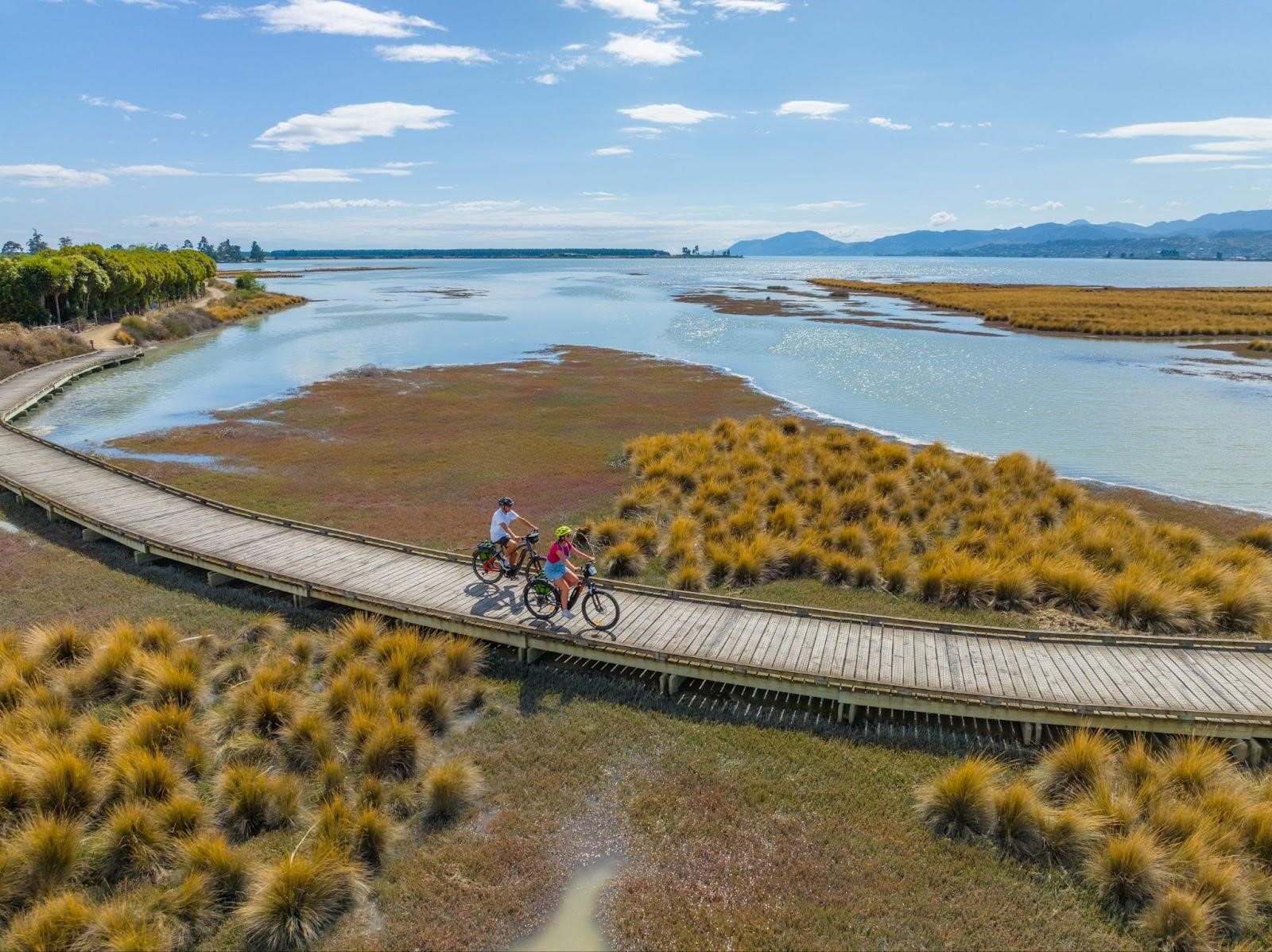New Zealand: Area Description
The type of experience you have will depend on when you visit New Zealand. It’s usually best to visit between December and March. This is the summer period, so you can get sunny, warm days. Here is what you can expect on your trip.
Geography of New Zealand
New Zealand is split across two islands, the north and south. Both offer exceptional trails for mountain bikers to explore. Generally, though, the weather is milder in the north, as the southern island blocks the winds.
One of the most exciting parts of New Zealand is that mountain bikers can experience a range of geological features. If you love mountain biking, check out the southern island, with the spectacular Southern Alps offering plenty of exciting tracks. If you want something more exciting, you can try riding the Volcanic Plateau on the Northern Island.
| Land Area Size |
103,590 square miles (267,710 square kilometers) |
| Minimum Elevation |
-6 feet (-2 meters) |
| Maximum Elevation |
12,218 feet (3,724 meters) |
Demographics of New Zealand
| Total Population Size |
5.12 million people |
| Population Density |
47 people per square mile |
Climate of New Zealand
Most people prefer to go cycling during the summer months, between December to March. This is when you can expect the sunniest skies. Plus, though there can be heat waves, summer tends to be fairly mild. If you don’t mind a cooler ride, you can visit during the autumn, between March and May. At this time of the year, you should still get plenty of sunny days without having to worry about tourists.
If you are a more experienced mountain bike rider, you might want to visit during the winter months, between June to August. This will allow snow to form on the mountain tracks. But these are the wettest months, which can force officials to close some trails.
The weather might vary a little depending on the island that you visit. Generally, the southern island will have colder temperatures, especially during the winter months. As always, though, it’s best to check the weather reports before you head out on your trip. This ensures that you can pack accordingly.
| Month |
Average Temperature |
| January |
66.4°F |
| February |
67.5°F |
| March |
65.1°F |
| April |
61°F |
| May |
57.2°F |
| June |
52.3°F |
| July |
51.6°F |
| August |
52.3°F |
| September |
54.9°F |
| October |
57.6°F |
| November |
60.3°F |
| December |
64°F |
Infrastructure
The New Zealand government has several national parks that mountain bike riders can explore. These are compiled under the NZ Cycle Trail program. These tracks are all routinely monitored to make sure they are safe to ride.
They are all easy to access, with trailheads having a place to park your car. Or you can ride the paved public roads to get into the national park. Occasionally, though, the tracks will be closed for maintenance. The NZ Cycle Trail website will update you if this is the case. It’s also important to remember that rainfall peaks during the winter months, if you are riding during this time, watch out for flooding.
Sights and Landmarks in New Zealand
The gorgeous landscapes you’ll experience will depend on the type of trail you pick. You might take in some of the stunning coastlines and beaches that have made New Zealand globally renowned. Or you can enjoy views of the snowy-topped mountain ranges. Don’t forget to plan stops in the local towns that you find along the trail to try delicious foods and beverages.
F.A.Qs About Mountain Bike Trails in New Zealand
How Hot Does It Get During the Summer?
Most of the time, summer days are fairly mild, around 70 degrees Fahrenheit. Though, New Zealand has also been prone to heatwaves, where temperatures can jump as high as 95 degrees Fahrenheit. So, check the weather reports before you head off.
What Is the Longest Trail in New Zealand?
The longest Great Ride is the Alps 2 Ocean Cycle Trail. This stretches for over 195 miles and takes you from the top of the Southern Alp Mountain range to the coastline of the Pacific Ocean. It is broken into multiple sections, so you can ride the whole thing or plan a series of day rides.
Can I Rent a Mountain Bike?
You shouldn’t find it too difficult to find a rental company that will loan you a mountain bike. If you are planning on bringing a bike into the country make sure to clean the wheels thoroughly to remove any dirt, ensuring that you don’t have any trouble with biosecurity.


 200 km
200 km